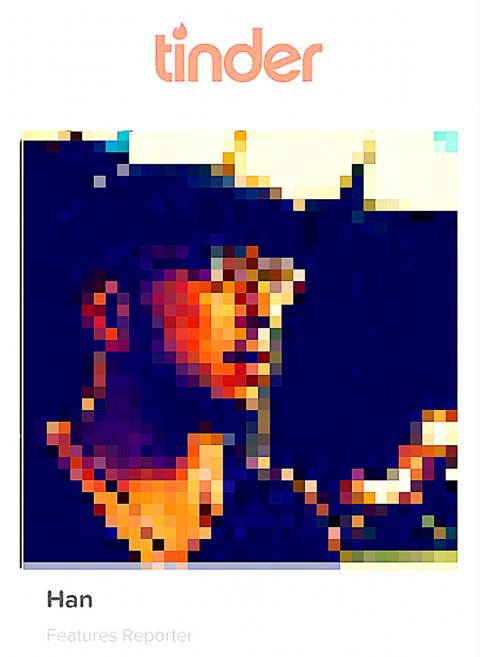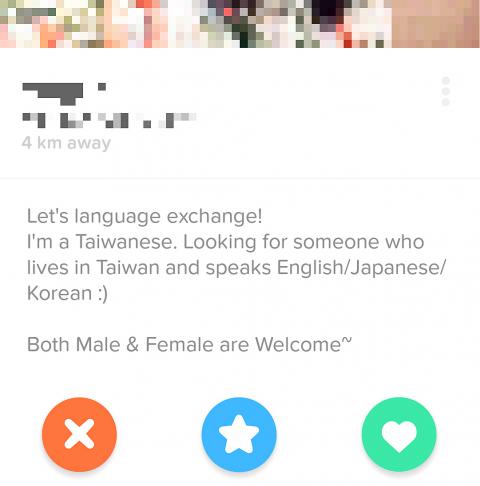“Tinder is so different here,” my Taiwanese friend who is spending a year in the US tells me. “People are so direct, and I’m getting all these [genital] photos too!”
I admit I’m still a bit surprised — of course I know what Tinder really is meant to be used for, but I never had a chance to swipe left or right despite living in the US when the app launched in 2012.
I didn’t have a smartphone for starters, but there was absolutely no point in using Tinder, or any dating app for that matter, in an isolated Wild West town of 9,000 people where everyone knew each other. I tried using Match.com, and it was painfully awkward, especially when everyone knows you as the editor of the local newspaper. So you simply wait for new people to move to town, hope they are single and act really, really fast.

Han Cheung, Taipei Times
Back in Taiwan and not knowing many people besides my childhood friends, I finally caved in to the Tinder craze after a break up.
WHAT’S IN A PROFILE
Expected were the trying-too-hard-to-look-cute girls making duck faces and ridiculous poses, the obviously fake accounts with the sexy poses and revealing clothing, and the ones with no photos of themselves — only clouds, rabbits and in one case, a ruler.

Han Cheung, Taipei Times
There was a lack of female expats or locals with good English skills — as opposed to what I was hearing from my female colleague regarding the male counterparts. My Chinese typing was rusty back then, so things started slowly. I was also thinking too much trying to craft “thoughtful” and “witty” messages, and most conversations went nowhere.
Needless to say, I found little success. I also soon noticed the number of “no FWB [friends with benefits]” and “no ONS [one night stands]” warnings in the profiles. Nothing wrong with that, I thought — this is not America.
Then it got somewhat tedious.
“I’m looking for new friends.” “I’m looking for language exchange partners. Male and female both welcome.” “I’m in a relationship and I’m only looking for friends.” ‘I’m not looking for anything romantic. Stay away.”
OK — so we understand that it’s not that much of a hookup app in Taiwan. But not even romance? It seemed to be the case, as people’s responses were usually overly polite or bland. That caused me to become overly aware of saying something inappropriate, and the conversations continued to go nowhere.
My friend tells me that it’s all a farce, and I should not play into their game of pretend. But when I later dated someone who continued to insist that she really, really, really downloaded the app to “practice English,” I just got more confused. No, you simply do not go to a site where you connect with people based on how hot they are to practice a foreign language. There are other resources for that.
NO CREEPS
Finally, I asked a date who had similar messages on her profile what this no sex, no romance thing is all about.
“Oh, that’s to ward off the creepy people who ask for sex right off the bat,” she said.
Anyhow, my interest in Tinder soon waned as I started meeting more people in real life, which I found more enjoyable than my pathetic online stint. I still kept the app running and replied to messages occasionally, putting minimal effort into the chatting. Instead of trying to think of the perfect, attention-grabbing opener, I just typed “Hey” and “Sup” without even punctuation marks.
Surprisingly, people actually started messaging me more often — I even got a “go [expletive] yourself” just for taking seven days to reply to a message. One time, after a month of not using Tinder, I messaged “Want to grab a drink?” to my entire match list on a whim to see who would reply.
“Do you send that to everyone?” one woman asked. Most didn’t reply, but there were three who said, “Sure!”
And then I finally was convinced that the subtlety is really superficial. And yes, sadly, to a certain degree it’s a numbers game and you do not actually need that witty first message.

Next week, candidates will officially register to run for chair of the Chinese Nationalist Party (KMT). By the end of Friday, we will know who has registered for the Oct. 18 election. The number of declared candidates has been fluctuating daily. Some candidates registering may be disqualified, so the final list may be in flux for weeks. The list of likely candidates ranges from deep blue to deeper blue to deepest blue, bordering on red (pro-Chinese Communist Party, CCP). Unless current Chairman Eric Chu (朱立倫) can be convinced to run for re-election, the party looks likely to shift towards more hardline

Last week the story of the giant illegal crater dug in Kaohsiung’s Meinong District (美濃) emerged into the public consciousness. The site was used for sand and gravel extraction, and then filled with construction waste. Locals referred to it sardonically as the “Meinong Grand Canyon,” according to media reports, because it was 2 hectares in length and 10 meters deep. The land involved included both state-owned and local farm land. Local media said that the site had generated NT$300 million in profits, against fines of a few million and the loss of some excavators. OFFICIAL CORRUPTION? The site had been seized

Sept. 15 to Sept. 21 A Bhutanese princess caught at Taoyuan Airport with 22 rhino horns — worth about NT$31 million today — might have been just another curious front-page story. But the Sept. 17, 1993 incident came at a sensitive moment. Taiwan, dubbed “Die-wan” by the British conservationist group Environmental Investigation Agency (EIA), was under international fire for being a major hub for rhino horn. Just 10 days earlier, US secretary of the interior Bruce Babbitt had recommended sanctions against Taiwan for its “failure to end its participation in rhinoceros horn trade.” Even though Taiwan had restricted imports since 1985 and enacted

Enter the Dragon 13 will bring Taiwan’s first taste of Dirty Boxing Sunday at Taipei Gymnasium, one highlight of a mixed-rules card blending new formats with traditional MMA. The undercard starts at 10:30am, with the main card beginning at 4pm. Tickets are NT$1,200. Dirty Boxing is a US-born ruleset popularized by fighters Mike Perry and Jon Jones as an alternative to boxing. The format has gained traction overseas, with its inaugural championship streamed free to millions on YouTube, Facebook and Instagram. Taiwan’s version allows punches and elbows with clinch striking, but bans kicks, knees and takedowns. The rules are stricter than the